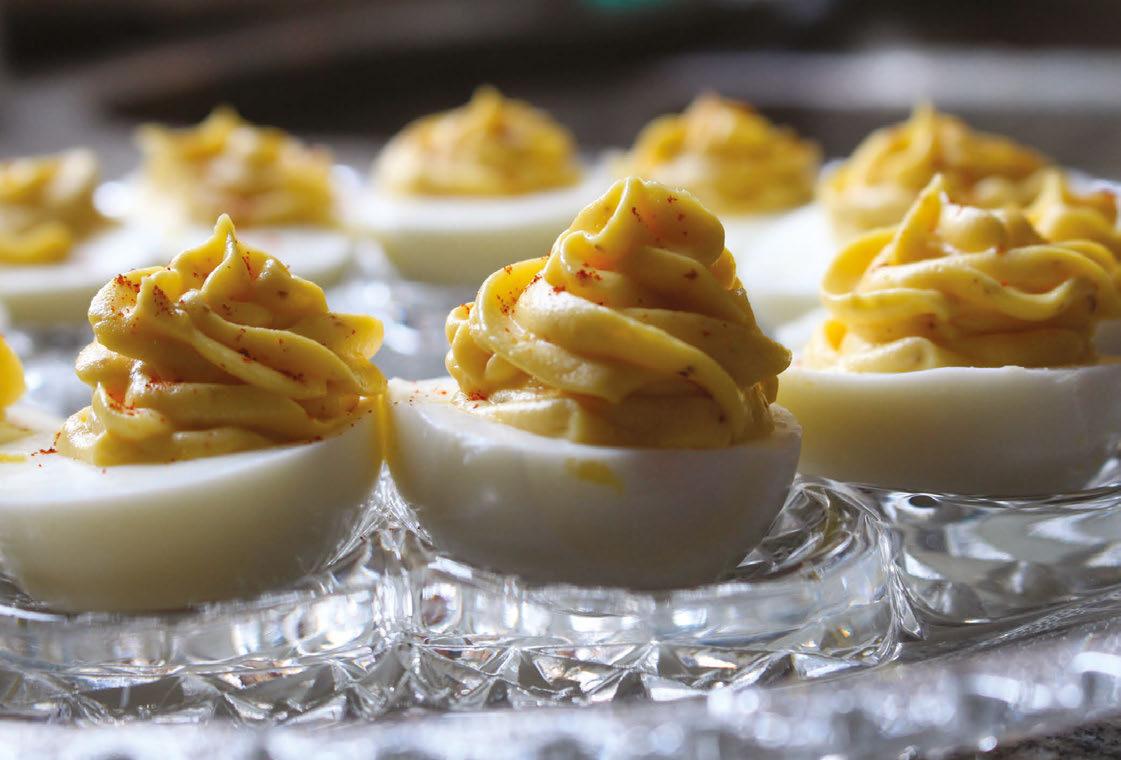
5 minute read
FOOD: Ode to the Egg
FOOD
ODE to the EGG
Advertisement
In this Southern standby, the devil’s in the details
Eggs have been symbols of rebirth and renewal for centuries, which puts them at the center of spring holidays such as Passover and Easter. And to my mind, there’s no finer example of the art of the edible ovoid than that jewel of the South: the deviled egg.
Sure, you can fuss with eggs. An Instagram-popular recipe for Middle
by DEBBIE MOOSE
Eastern shakshuka involves simmering eggs in a spicy tomato-and-onion stew. That’s more effort than I can generally muster in the mornings, particularly pre-coffee. You can strain a wrist muscle trying to neatly turn over an omelet.
Generations of kids were needlessly forced to tiptoe around while soufflés were baking — including my husband, whose mother accused him of making her soufflé fall by walking through the kitchen with his giant teenage feet. Completely untrue, according to cooking science, but it left him with a fear of soufflés.
However, the simple perfection that is the deviled egg is within everyone’s grasp, and it uses ingredients most have right at home. It’s truly a snack of the people, and has never been even theo-
retically affected by someone’s size-13s.
Deviled eggs are found all over the country. But as it is with college football and humidity, no one does deviled eggs like the South. For generations, battles for bragging rights have been fought at family reunions, church suppers, and tailgates, via surreptitious glances to see whose platter is emptying the fastest. The winner earns the right to smugly lord over their cousins and neighbors until the next showdown.
For my mother’s generation, deviled egg plates — those glass or china platters with oval indentations that make perfect settings for the savory gems — were standard wedding gifts. Several years ago, I met a Morehead City woman who had collected more than 800 deviled egg plates; she was going for a Guinness World Record. After the plates took over the living room, her husband built an extension onto the house just to display the overflow. I have a mere twelve plates.
If my mother ever received a deviled egg plate, it was never used. She hated eggs, and deviled eggs in particular, so she didn’t make them. In fact, the only time I remember her hard-cooking eggs was to dye at Easter and lose in the yard.
One of nature’s paradoxes is how parents can end up with children of completely opposite temperament and interests from themselves. So it was with me: born into a deviled egg-deprived home, they were all I could think about. I looked forward to visiting my grandmother, my one regular source for deviled eggs, and devouring her silky smooth, mustard-tart creations.
Some teenagers smoked pot to rebel; I experimented with mayonnaise and pickle relish.
To fuel my obsession, I wrote an entire cookbook on deviled eggs. I learned minutiae of egg anatomy (peeling is easier if you start at the big end, where an air pocket is); how to get the yolk exactly in the center of the white (store the carton of uncooked eggs on its side in the fridge); and why they’re called deviled eggs (early recipes used spicy ingredients, hence the term “deviling”).
The deviled egg itself has been reborn in restaurant kitchens, as small plates took over restaurant menus — possibly because their combination of intense flavor and rich creaminess creates a satisfying small bite.
That’s great — but I have a message to chefs who put an odd number of eggs on a plate for two people to share: don’t. Anyone who fights this Southern woman for the last deviled egg will always lose, and I’d like to keep my friends.
Debbie Moose is the author of seven cookbooks, including her newest from University of North Carolina Press, Carolina Catch: Cooking North Carolina Fish and Shellfish from Mountains to Coast.
Make a Statement


Diamonds, Estate and Antique Jewelry • Loose Diamonds of all Shapes and Sizes • Certified Appraisals • Expert Jewelry Repairs WE BUY DIAMONDS, GOLD AND PLATINUM
Retirement living. Better than you ever imagined.




Welcome to a life that’s anything but ordinary. When you live at The Cypress, Raleigh’s preeminent Life Plan Community, you’ll experience luxury retirement living at its very best. Whether it’s the resort-style amenities, carefree lifestyle, world-class healthcare facilities, or the chance to own your own Cottage or Villa, The Cypress is the right choice for so many reasons. Get ready to rethink what you know about retirement living. Come see what’s possible at The Cypress of Raleigh.
We’re available to meet via Zoom or in person. Call 919.518.8907 to schedule. To learn more visit thecypressofraleigh.com


DEBBIE MOOSE’S CREAMY FETA DEVILED EGGS
Feta and olives give these rich deviled eggs a Greek accent. These two ingredients can be salty, so you may not need to add salt to the filling; taste and see. If you can’t find fresh chives, substitute the tops of green onions.
Ingredients 6 hard-cooked eggs* 2 tablespoons sour cream 1 1/2 teaspoons lemon juice 1/3 cup crumbled feta cheese 3 teaspoons finely chopped fresh Italian parsley leaves 2 teaspoons finely chopped fresh chives 1/4 teaspoon black pepper Finely chopped black or Kalamata olives for garnish
Directions
Peel the eggs and cut them in half. Put the yolks in a medium-sized bowl and mash well. Set the whites aside. Stir the sour cream, lemon juice, and feta into the yolks until well combined, then stir in the parsley, chives, and black pepper. Fill the whites evenly with the mixture. Top each egg half with a few bits of chopped olives. Makes 12.
*My method for hard-boiling eggs comes from the American Egg Board: Place large eggs in a saucepan in one layer and cover with cold water. Let come to a good rolling boil. Then remove the pan from the heat, cover, and set a timer for 15 minutes. When it goes off, drain and cool down the eggs under cold running water or in a bowl of ice water.










